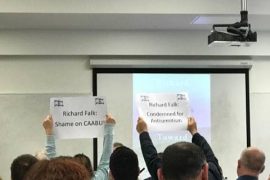This is a guest post by Emily Hughes

Large organizations such as Oxfam can seem monolithic and impenetrable. Who decides on policy and what motivates those people? Does everyone in the organization have the same opinions and world view, or are there serious disagreements behind the facade? If we could see behind the press releases and the official reports, could we catch a glimpse of what motivates the individuals that write them?
Oxfam likes to claim that it is a non-political humanitarian organization, and its work in places like Haiti and Pakistan is inspiring, particularly in the areas of provision of clean water and sanitation. But its position on many issues in the Israeli-Palestinian conflict appears anything but balanced. While ostensibly in favour of the two-state solution, Oxfam partners with and funds organizations (such as Adalah) that call for a one-state solution. This summer, Oxfam ran a long campaign to lift the blockade on Gaza in which the word “weapons” was conspicuously absent. Oxfam issued press releases that insisted on inferring that the Mavi Marmara a humanitarian mission and it persists on referring to this area of the world as the “Occupied Palestinian Territories and Israel”.
Oxfam’s Communication Officer in Gaza, Karl Schembri, has his own blog called “Journey to Gaza”, that provides us with an opportunity to see a bit more of what type of thinking is going on inside Oxfam. It is imperative here that I emphasize that “Journey to Gaza” is a personal blog and that Karl does not once mention Oxfam in it. It therefore does not reflect the official standpoint of Oxfam. However, it does provide insight into how a key person within Oxfam views Israelis and Palestinians, and the conflict between them. It also shows us what type of person and background Oxfam is looking for when hiring for a media spokesperson on a very sensitive area.
Karl is from Malta, and was originally a journalist there, writing for a variety of newspapers and becoming deputy editor for Malta Today. He has written a couple of novels in Maltese and poetry, some of which has been translated into English on the internet, notably one entitled “Jenin” that starts with “A boy’s been hit in the head by an Israeli’s submachine gun”. He then worked as a journalist for Ramattan News Agency in the West Bank, but he has also published articles in the Guardian and the Telegraph. He speaks Arabic well (the roots of the Maltese language and a significant part of its vocabulary come from Arabic) which often surprises the Palestinians that he meets. He entered Gaza in September 2009 via Egypt along with some friends who were members of Code Pink. He did not admit to the Egyptian authorities that he was a journalist, but posed as a student. It is unclear when he started working for Oxfam. His first entry on Oxfam’s website is dated January 1, 2010, so I assume he was hired by Oxfam while he was in Gaza in the autumn of 2009.
Karl’s blog has many stories on it—stories about fishermen who cannot fish beyond the two nautical mile limit enforced by the Israelis, stories about people with medical conditions who are having trouble getting permits to go to Israel, stories about the cheese maker who can no longer make cheese and stories about the electrician whose job it is to decide which neighbourhood of Gaza City gets electricity today, and who is to be cut off. These are largely sad stories, and they are indeed sad, but totally lacking in context. There is no indication that fishing boats have smuggled in weapons before and in the article about people needing hospital treatment, there is no mention of the thousands upon thousands of Gazans who have succeeded in receiving medical care in Israel.
Karl’s opinions on many subjects are what you would expect. The protests at Bil’in are, according to him, entirely peaceful. The Goldstone report, he says, is highly respected by all reputable human rights organizations.
But when Karl gets creative in his writing, we can begin to see more ominous undertones. For example, in March 2010, he calls the blockade of Gaza “the creation of a laboratory-case humanitarian situation”. But it is not until September 2010 that he really expands on this theme:
“For Israel, Gaza has served as the testing ground of Israeli military gadgets and policy engineering. Over the years, Israel’s policies have turned Gaza into one big laboratory with 1.5 million test cases. Among the experiments: total occupation to protect a few thousand Jewish settlers, unilateral disengagement of Israeli troops and total closure.”
This is an extraordinary statement, and one that I find particularly vile. Karl is saying here that Israelis are evil scientists who experiment on their helpless Palestinian victims. It implies that Karl thinks that not only can he see Israeli actions, but that he also has the ability to perceive their secret motivations as well. The “evil scientist” imagery implies that Israelis are all-powerful, cruel and inhumane.
What is ironic is that many Israelis did consider the disengagement from Gaza an experiment: an experiment for peace. Palestinians had been occupied by the Ottomans and then by the British. Between 1948 and 1967 they were occupied by the Jordanians (West Bank) and the Egyptians (Gaza). The Israeli withdrawal from Gaza was the first time that the Palestinians were in total control of their own territory. It was an experiment indeed. It is impossible to believe that Karl is unaware of this viewpoint, and so it must be that he leaves it out on purpose.
Why? The idea of the disengagement from Gaza being an experiment for peace not only shows the Israelis in a more positive light than he wishes to do so but it also throws the responsibility back onto the Palestinians. In Karl’s version, the Palestinians are entirely passive. In the series of “experiments” that he relates, there was nothing they have done that might have caused an Israeli reaction.
Karl’s view that all evil emanates from Israelis is also evident in this passage from September 2009, where he is waiting in Egypt at the border crossing into Gaza:
“At one point we could see a truck full of African immigrants under the watch of armed soldiers being rushed out of the area. Thousands of them, mostly from Darfur, cross the desert in their bid to enter Israel. Even here, Egyptian border patrols do the policing for the Israelis, killing many of them on the way and arresting others who will never get a chance to seek refugee status even though they are potentially fleeing persecution.”
I sat and stared at this last sentence for some time. What did Karl think he was doing here? He doesn’t say how the Israelis get the Egyptians to “do the policing” for them. It is a very serious accusation but he provides no evidence. Does he imagine, perhaps, that the Israeli government pressures the Egyptian government, who then send instructions down the line to the border patrols? Does he think the Israelis bribe the border guards directly to kill for them? Do they use evil Zionist mind control? He doesn’t say, so we don’t know. Perhaps Karl hasn’t thought it out completely himself.
I try to imagine the situation: he sees the Africans being driven away in a van. He knows that it is likely they will be killed; if they are lucky, they will be shot. But he is powerless to do anything. It is an awful dilemma for anyone to be in. I know that if put in a similar situation, I would have sleepless nights for weeks or more. My mind would be in turmoil: could I have done anything? Should I have spoken to one of the Egyptian officials present? The attempt would undoubtedly be useless, but should I have at least tried? Could it be that it is feelings like these that are part of what motivates Karl to displace blame from the Egyptians (who are there with him and to whom he could presumably have protested) to some nameless and faceless Israelis? Evil that is a long way away is easier to deal with than an evil that is present in the person standing next to you. Yet I suspect that the stresses of the moment are not the only reason that Karl wishes to displace blame.
Karl knows that refugees from Africa are safe if they reach Israel; he also knows the Egyptians kill them. I think Karl has trouble coming to terms with a situation in which it is blindingly obvious that the Israelis act with compassion. It does not fit his image of them and the dissonance is too much for him. Moving the blame from the Egyptians to the Israelis does the trick. Does he realise that he is lying? Or do his eyes glide from the word “Egyptians” to the word “Israelis” and he simply feels a welcome relief? Logic doesn’t come into it. The Israelis are again responsible for the evils in the world; things are as they should be. The Egyptians are merely helpless pawns in the hands of the Israelis.
Karl also has difficulties with fact checking and with numbers. Here is one example from January 2010:
“Fidaa is only one of hundreds of Gazans who are refused permission to travel to Israel or other third countries every month for life-saving medical treatment. Last year, 27 Palestinian patients died while waiting for Israeli permits.”
That figure intrigued me. Anyone dying while on a waiting list is tragic and I agree with Karl that twenty-seven people is twenty-seven too many. But I also wanted to put that number in context. How many people die while on hospital waiting lists in other parts of the world? As a journalist, Karl must be accustomed to doing research. He must also be aware of the necessity to provide a context so that readers can judge the significance of figures.
It only took me about 5 minutes searching on Google to find some comparable numbers. According to the Sunday Times, 60 patients over a three-year period (1997 to 1999) on the cardiac surgery waiting list at the Royal Infirmary of Edinburgh died. That means roughly 20 people a year. The Royal Infirmary has a catchment area of about 778,000 people, equivalent to approximately half the population of the Gaza Strip. So here I have the death figures for residents of Edinburgh dying while on a waiting list for cardiac disease only; the numbers dying of all medical causes while on waiting lists in Edinburgh must be far, far higher. Yet even so it seems that a Scot in Edinburgh was more likely to die while on a waiting list for heart surgery than a Gazan waiting for any type of medical treatment in Israel. All of sudden, that figure of twenty-seven people does not seem so bad. For the individuals and their families, it is still tragic, and I have no objection to anyone wanting Israel (or the NHS) to improve their access to treatment. But as an assessment of a government’s record, the 27-person statistic is very favourable to Israel.
Karl also quotes various people in his blog who make statements that would be easy to verify or disprove. But if the slant is anti-Israeli, he never bothers to check the facts. In an article from October 2009 on an art exhibit in Gaza, Karl writes about one of the artists exhibiting:
“Another artist from Gaza exhibiting her works is Maha Daya, whose colourful landscapes with domed buildings and arched doorways give one a glimpse of her dream of Jerusalem. Her last visit to Jerusalem was in 1996, and she is well aware of the ongoing changes happening under Israeli occupation.
[Daya said:]
“If I had to go there again I’m sure I’d find that a lot has changed. It’s not just the landscape and the buildings, but also the people – there are much fewer Palestinians living there now.”
It is clearly not difficult to check population figures for Jerusalem and to find that Maha Doya is wrong—the Palestinian population of Jerusalem has increased since 1996 both in absolute terms and as a percentage of the total. Yet Karl does not do this, and allows Maha’s statement to stand unchallenged.
In April 2010, Karl wrote the following:
“In the last war, 50% of children lost a close relative or friend, 54% witnessed assassination of people by rockets. Over 90% heard the shelling of their area by Israeli artillery and the sonic sounds of jet fighters, and an equal amount witnessed shelling on the ground and saw mutilated bodies on TV.”
Karl does not provide a source for these figures, but a bit of thinking shows that the first statement is impossible. Fewer than one out of thousand people died in Operation Cast Lead. That means that if half of the children had lost a “close friend or relative”, the average child must have 500 close friends or relatives. Or to put it another way, imagine an English village with a population of 2000 people. Now assume that two people in that village died. How likely would it be that those two people were immediate family members or close friends of half the children in the village?
There are countless more examples from the blog that I could give here. In fact, his blog is a gold mine of anti-Israel invective. Reading entry after entry, the question that kept going through my mind was, “Why did Oxfam hire Karl Schembri?”
His ability to speak Arabic and to write in English is obviously a big plus. But his opinions and record were there to be easily checked. It would have been very simple to verify that he had a somewhat sloppy approach to fact checking, that he was clearly partisan, and that there was no way that he could be an appropriate spokesperson for a purportedly impartial organization. If I were in the position of hiring, I would be looking for someone stolid, pragmatic, factual and down-to-earth. I would want someone with no previous involvement on either side in the region. I would prefer, if possible, to find someone who had worked before in another area of the world that was also suffering from severe conflict. I would want someone who was very careful about checking facts – someone who could rise above the mud-slinging nastiness, the innuendo, and the outright lies that characterize discourse about the Israeli-Palestinian conflict. Karl Schembri simply doesn’t fit the bill.




